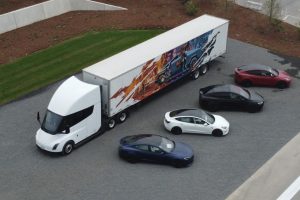Key Points
- 🏭 GM has closed a Kansas manufacturing plant, resulting in the layoff of approximately 2,000 workers.
- 🤝 The plant closure and layoffs coincide with ongoing negotiations with the United Auto Workers (UAW) union.
- 🚗 UAW strikes have affected multiple automakers, including Ford, GM, and Stellantis.
- 💼 GM cites the UAW’s demands as “untenable” and emphasizes the negative impact of strikes.
- 🌐 The strikes have disrupted key manufacturing plants and supply chains.
- 💰 Stellantis has announced layoffs at an Ohio facility and warns of more in Indiana if conditions do not improve.
- 🚦 Ford has also laid off hundreds of employees at a Michigan plant.
- 📢 UAW President Shawn Fain threatens to broaden strikes if automakers don’t make significant progress in contract negotiations.
- 💰 UAW is seeking substantial pay increases and reduced work hours, while automakers offer smaller wage hikes.
- ⚡ Ripple effects from the strikes may impact the broader auto industry, including EV manufacturers like Tesla.
- 🚗 Tesla, while not directly involved in the strikes, faces challenges related to workforce stability amid the transition to electric vehicles (EVs).
- 🚫 Unlike traditional automakers, Tesla’s exclusive focus on EVs may give it certain advantages during this period of labor unrest.
General Motors (GM) has shut down a manufacturing plant in Kansas and laid off the site’s roughly 2,000 workers after the automaker stated plans to do so last week. The news comes as the latest amidst strikes from the United Auto Workers (UAW) union targeting Ford, GM and Stellantis.
Following the UAW strikes at a GM assembly plant in Wentzville, Missouri last Friday, the automaker said on Wednesday that it doesn’t have work available for its Fairfax, Kansas workers, according to NBC News. GM has also said it won’t be able to offer unemployment benefits to the workers “due to the specific circumstances of this situation.”
“The fundamental reality is that the UAW’s demands can be described in one word — untenable,” wrote GM President Mark Reuss in an op-ed for Detroit Free Press on Wednesday. “As the past has clearly shown, nobody wins in a strike. We have delivered a record offer. That is a fact.”
Roughly 12,700 workers from GM, Ford and Stellantis walked off the job after previous union contracts expired last Thursday. The UAW strikes have targeted key manufacturing plants, asking workers to leave the premises without any notice to affect the automakers’ larger supply chains.
Jeep, Chrysler and Dodge owner Stellantis announced plans to lay off 68 workers at an Ohio facility, warning of another 300 layoffs in Indiana if the situation does not improve.
Additional layoffs are happening at a Stellantis machining plant in Perrysburg, Ohio, outside of Toledo, due to “storage constraints.” The company predicts a similar situation at a transmission and casting plant in Kokomo, Indiana.
Ford also laid off around 600 employees at a plant in Wayne, Michigan.
UAW President Shawn Fain has warned that the union will broaden strikes on Friday if the automakers don’t make “serious progress” on creating a new contract. Roughly 150,000 workers total are represented by the UAW.
Currently, the UAW is asking for pay increases of between 36 and 40 percent over a four-year period, a 32-hour work week, significant changes to the time it takes to earn top wages and more. The automakers have offered contracts featuring roughly 20 percent wage hikes over four years.
Strikes have so far hit GM’s full-size van and midsize truck plant in Wentzville, a Ford Bronco SUV and Ranger midsize truck plant in Wayne, Michigan, and a Stellantis plant in Toledo, Ohio, which produces the Jeep Wrangler and Gladiator.
According to Reuters, the three automakers remained in a negotiation stand-off with the UAW on Wednesday, ahead of the union’s plans to escalate strikes to other facilities. Analysts think that the next wave of strikes could target production facilities building more profitable pickups, such as the Chevy Silverado from GM and the Dodge Ram from Stellantis.
Ford reached a deal to prevent a mass walkout of Canadian workers on Tuesday after the union Unifor threatened a strike of its roughly 5,600 workers across three plants in the country.
The agreement has still yet to be ratified by Unifor, and Ford Canada said it wouldn’t disclose details about the deal. However, it reportedly included improved wages and pensions along with added support for transitioning to electric vehicles (EVs).
While EV manufacturer Tesla isn’t unionized and is not directly involved with the strikes, transitioning to EVs has been a main concern for the unions, as EV production requires fewer employees. As such, the UAW seeks to increase workers’ stability amidst the EV transition.
Tesla only builds EVs, so unlike the “Big 3,” the automaker won’t have to phase out gas car production. Some predict that the strikes could benefit the EV maker, while others argue that ripple effects from the strikes could turn out to be a negative across the auto industry.
You can watch UAW President Shawn Fain’s update below, posted on Tuesday, in which he warns of the upcoming Friday deadline. Link to video here.





